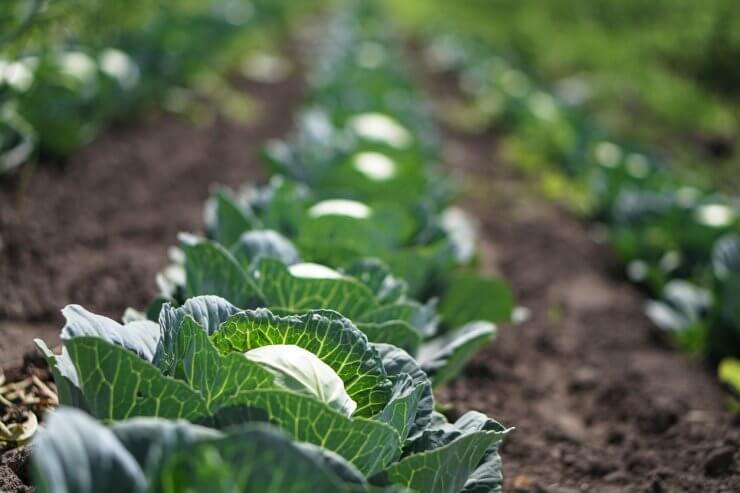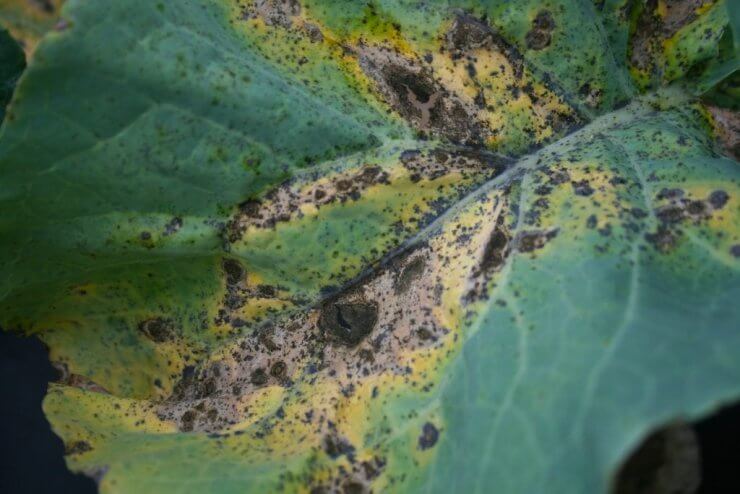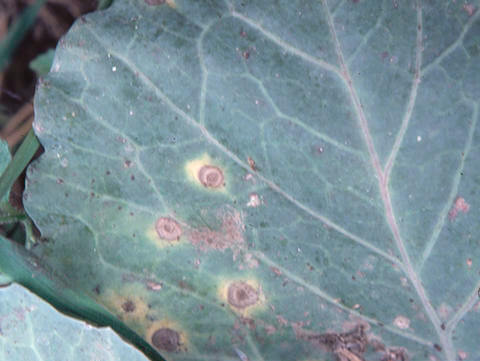
Alternaria leaf spot, sometimes called black spot, is common in Brassica crops. Symptoms of this fungal disease include small, black lesions with a yellow ring around them. In its more advanced stages, the disease spreads, and these black spots grow into concentric rings, often with holes in the center. And eventually, individual spots meet, leaving you with large areas of dead plant tissue.
Aside from the cosmetic damage, is Alternaria leaf spot anything to worry about? What causes it? Can you prevent it? Or treat it? Here’s the dirt on this disease.
Discover 7 top tips for growing, harvesting, and enjoying tomatoes from your home garden—when you access the FREE guide The Best Way to Grow Tomatoes, right now!

Black fungal growth spores on cabbage leaf.Image courtesy of Cornell University.
What is Alternaria leaf spot?
Alternaria leaf spot is a disease caused by three species of fungi: Alternaria brassicicola, A. brassicae, and A. raphani. As you can perhaps tell from the names, Alternaria brassicicola and A. brassicae are the two that most frequently infect Brassica crops, while A. raphani is more commonly found on radishes.
Warm temperatures and high humidity promote spore production, which are then released and spread in dry periods. The University of Massachusetts Amherst points out that “The optimal conditions for new infections are temperatures between 55 and 75°F and high relative humidity or periods of long leaf wetness. Spores produced in the summer heat will proliferate once the weather cools going into the fall.”
All that said, unless you’re doing scientific research, the specific species is somewhat irrelevant. They all cause Alternaria leaf spot, have similar habitats, and prevention and treatment are the same. And you can’t do a whole lot about the temperature or humidity, so your best bet is to know where it comes from and what you can do about it.
Before we get into what causes this disease, let me give you a little good news. For most of us home gardeners, a little leaf spot won’t hurt anything. The disease can impact longer-term storage of some crops, and, of course, extensive damage can limit crop yields. Plus, any plant infection weakens them and leaves them open to other diseases or insect damage. But a little leaf damage doesn’t mean you have to compost all that tasty kale.

Characteristic Alternaria leaf lesions.
Image courtesy of University of Minnesota.
Now then, where does this pesky disease come from?
1. Infected seeds. According to the Cornell College of Agriculture and Life Sciences, infected seeds are one of the most common sources of Alternaria brassicicola. They point out that the fungus may live on the seed surface, as well as internally.
2. Plant debris. The spores produced by the Alternaria fungus can overwinter on plant debris and begin reproducing once the temperature and humidity levels are ideal.
3. Wind. Airborne spores can easily cover great distances. So even if you don’t have any infected seeds or diseased plant debris, the fungus can still spread from other areas.
4. Soil. The Alternaria fungus can survive in the soil, and may overwinter.
5. Rain or water. Fungus on the soil can splash up onto plants when it rains or if water from a sprinkler splashes and gets soil on a plant.
6. Insects. Although any insect could potentially spread Alternaria leaf spot, the flea beetle is one insect specifically mentioned by Cornell.
7. Equipment. There are plenty of good reasons to keep your gardening tools clean. Here’s another you can add to the list. The spores that cause Alternaria leaf spot can spread on your gardening equipment.
How to prevent or treat Alternaria leaf spot
- Buy certified, disease-free seeds.
- Prune and trim your crops so the air can help reduce moisture.
- Water early in the day so your crops aren’t damp overnight.
- Water the soil, not the fruit. Again, we’re trying to eliminate the conditions in which this fungus thrives.
- Keep up with weeding—especially Brassica weeds.
- Rotate your crops.
- Clean your garden at the end of the season. While some debris is beneficial for bees and other pollinators for overwintering, you also don’t want to promote disease.
- Practice healthy gardening with a variety of native plants and pollinator-friendly practices.
If you do end up with Alternaria leaf spot, despite your best efforts, here are a few steps you can take.
- Since the disease is mostly cosmetic in limited amounts, work in areas with the fungus last.
- Remove diseased plants unless all plants are diseased, in which case you only need to remove the diseased leaves.
- Relax.
For most home gardeners, there’s not a lot you can do about Alternaria leaf spot. Do what you can to prevent it, and take steps to limit the spread if you do notice it. But otherwise, enjoy your garden!
Do you have any tips for dealing with Alternaria leaf spot? I’d love to read about them in the comments.
Note: Food Gardening Network contains links to affiliate websites, including Amazon and Rakuten Affiliate Network, and we may receive a commission for any eligible purchases made by you through links on this page. Any reviews are based on honest reviews of the products.
Discover 7 top tips for growing, harvesting, and enjoying tomatoes from your home garden—when you access the FREE guide The Best Way to Grow Tomatoes, right now!




